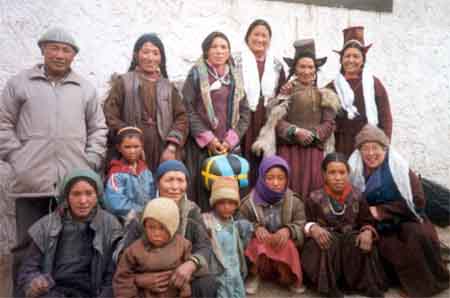Dec 21, 2025
Dec 21, 2025
by Ashima Kaul

Around 30 women from the villages of Darbuk, Khalsi, Kharu, Leh, Nubra and Nyoma blocks step inside the Women's Alliance of Ladakh (WAL) office in Leh city to strategize and prepare the agenda for the village meetings to be held during the winter season when the entire farming community, especially the women, is free from harvesting. Dolma Tsering, President of WAL, is happy that all the women at the meeting are wearing traditional dress. "By wearing our traditional dress during meetings and public interactions, we make sure that the culture of Ladakh does not die," says Tsering.
Spread over 100 villages with a membership of 5,000, WAL actively engages in countering the negative consequences of the global economy and development in Ladakh. "In the new 'modern' economy, where political and economic power is so centralized that decisions affecting our lives are taken in air-conditioned corporate houses and remote government departments, women are getting absolutely marginalized," says Tsering.
She adds, "In our traditional systems, the real centre of power - though the formal decisions are taken by men at the village level - is the household, where women and men enjoy largely equal status. With the economy becoming more global, women are the worst affected. Men leave home for jobs in the cities and the entire burden of looking after the family falls on women. We are aiming to reverse the trend."
When the government opened Ladakh for adventure tourism in the mid-1970s, things began to change rapidly. "There was a sudden influx of money, 'modernity', and government-led initiatives that sought to 'develop' the area," says Tsering. The new cash economy led to the breakdown of the traditional co-operative system and created a need for expensive hired Labour. This imposed a financial burden on the household and threatened the viability of traditional co-operative farming in Ladakh.
In 1991, a group of Ladakhi women took it upon themselves to address the negative impact of 'western' trends and impact of tourism in their region. They formed WAL with the aim of promoting development in harmony with the ethical and spiritual values that they believe their culture is based on.
"Moreover, we wanted to check the migration of women from rural to urban areas. Our initiative encourages the continuation of shared Labour, such as co-operative ploughing and harvesting," says Tsering. It also started providing information on the nutritional superiority of locally grown foods over imported, packaged foods transported from great distances at high costs.
WAL, along with its partner organization, the California-based International Society for Ecology and Culture (ISEC), started supporting locally adapted, sustainable agricultural methods, while raising awareness of the hazards of industrial agriculture such as pollution from chemical pesticides and fertilizers. WAL has instituted a seed bank to preserve indigenous seed varieties adapted to Ladakh's unique ecology. "Our seed bank is very popular in Ladakh," says Tashi Lamu, Secretary of WAL.
Lamu hails from Choglamsar, a small village about eight km from Leh. She agrees that it is impossible to revert to all the traditional methods of farming but feels it is possible to retain the co-operative system of farming. "It provides for social and economic security to farmers. We are also encouraging farmers to use traditional ways of fertilizing and to reject chemical pesticides."
In 1998, WAL started a campaign against the use of polythene bags. WAL members claim it has been one of their most successful projects.
WAL women are also creating awareness about women's social and legal rights. "Last year (2003), a woman was gang-raped in Leh. The women got together to form the Women's Action Committee to punish the guilty, build awareness amongst the youth about social values and reinforce Ladakhi culture and pride," says Thinles Angmo, an advocate in the district courts and former member of the State Women's Commission.
One of the major issues plaguing Ladakhi society is the problem of children disowned by their fathers. According to Dr Tsering Ladol, the first women gynecologist of Ladakh and a member of WAC, men (mostly married) earlier used to agree - due to social pressure - to give their name to the children they had from their lovers. The panchayat (village council) often settled an amount that the man paid as maintenance for his child. However, attitudes have changed now. More and more men are trying to disown their children by using money, power and influence. "We are encouraging woman to approach the courts and we might even opt for DNA testing if the man refuses. Two women have recently filed a petition and WAC is supporting them," says Ladol.
Tsering says she is happy that women's groups have become so active in Ladakh. "We feel pleased that men, too, are recognizing our work and supporting us. I was especially happy when the sarpanch (village council head) of Kyungyam village, in a public speech, praised our work and noticed the transformation in the village women."
It has been an uphill task to work among Ladakh's rural women. "Initially, they were hesitant and shy. But now they participate in village meetings and decision-making," says Tsering. According to Ladol, a significant role the Ladakhi women (especially the women's wings of the Ladakh Buddhist Association and Ladakh Muslim Association) can play is in building good relationships between Buddhists and Muslims. "We are aware of the challenges and growing divide within the Ladakhi community. Hearts and minds have to undergo transformation. Women have a major role in reconciliation and building peace," says Ladol.
A task many women feel they are good at.
07-Nov-2004
More by : Ashima Kaul